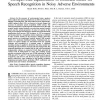Free Online Productivity Tools
i2Speak
i2Symbol
i2OCR
iTex2Img
iWeb2Print
iWeb2Shot
i2Type
iPdf2Split
iPdf2Merge
i2Bopomofo
i2Arabic
i2Style
i2Image
i2PDF
iLatex2Rtf
Sci2ools
117
click to vote
TASLP
2010
2010
Unsupervised Equalization of Lombard Effect for Speech Recognition in Noisy Adverse Environments
In the presence of environmental noise, speakers tend to adjust their speech production in an effort to preserve intelligible communication. The noise-induced speech adjustments, called Lombard effect (LE), are known to severely impact the accuracy of automatic speech recognition (ASR) systems. The reduced performance results from the mismatch between the ASR acoustic models trained typically on noise-clean neutral (modal) speech and the actual parameters of noisy LE speech. In this study, novel unsupervised frequency domain and cepstral domain equalizations that increase ASR resistance to LE are proposed and incorporated in a recognition scheme employing a codebook of noisy acoustic models. In the frequency domain, short-time speech spectra are transformed towards neutral ASR acoustic models in a maximum likelihood fashion. Simultaneously, dynamics of cepstral samples are determined from the quantile estimates and normalized to a constant range. A codebook decoding strategy is applied...
Related Content
| Added | 21 May 2011 |
| Updated | 21 May 2011 |
| Type | Journal |
| Year | 2010 |
| Where | TASLP |
| Authors | Hynek Boril, John H. L. Hansen |
Comments (0)

